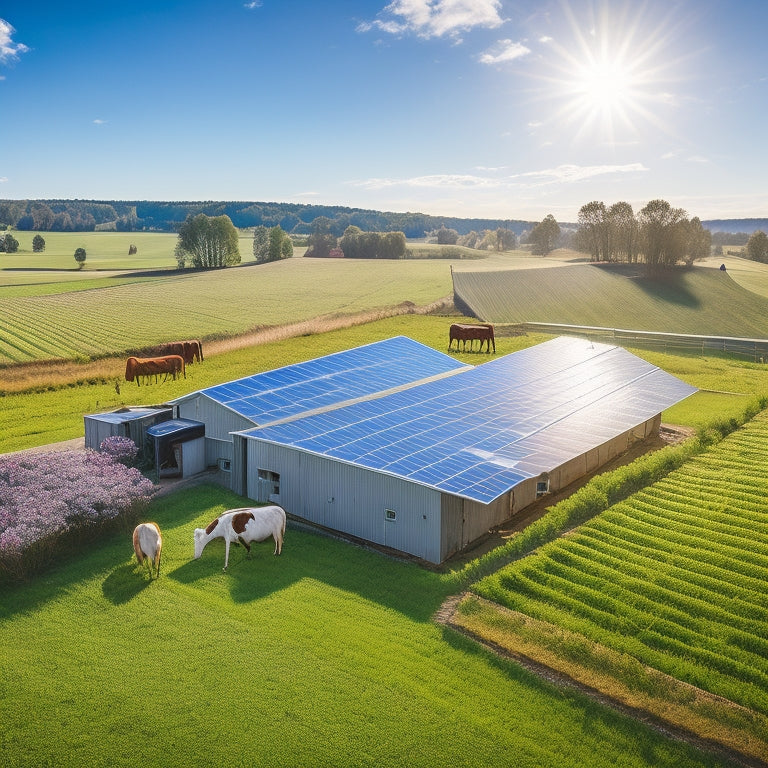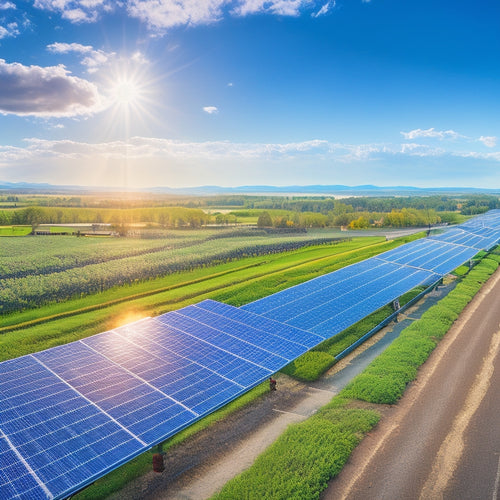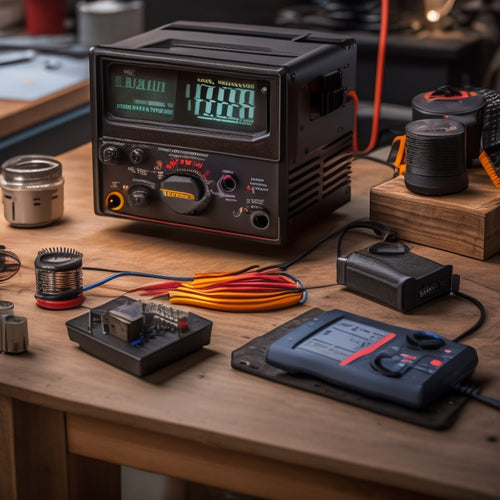
What Do I Need to Know About Farm Solar Panels
Share
When considering farm solar panels, you need to assess costs, benefits, and technical specifics. Initial investment covers purchase and installation, but financial incentives like tax credits can ease this burden. Focus on panel efficiency ratings above 18% for ideal energy output. Conduct an energy needs assessment to size your system correctly and guarantee adequacy during low sunlight periods. Keep in mind that solar panels require minimal maintenance, allowing you to concentrate on farming. Investing in solar not only reduces energy costs but also enhances property value, positioning you well in a competitive market. There's much more to uncover about this sustainable solution.
At a Glance
- Assess your energy needs to determine the appropriate solar capacity for your farm's operations, factoring in seasonal fluctuations and total usage.
- Consider the initial investment, including the cost of panels, inverters, and installation, along with available financing options to alleviate expenses.
- Explore federal and state tax incentives, rebates, and grants that can significantly reduce the overall cost of solar panel installation.
- Ensure compliance with local regulations and secure necessary permits before installation, including site assessments for optimal panel positioning.
- Solar panels require minimal maintenance, primarily needing periodic cleaning, allowing farmers to focus on operations while contributing to sustainable practices.
Cost-Effective Energy Solution
When considering farm solar panels, you'll need to evaluate the initial investment against your long-term savings potential.
The agricultural integration of solar panels can offer additional income streams for rural landowners, making the investment even more appealing. Analyzing the upfront costs helps you understand the financial commitment, while calculating future energy savings can reveal significant benefits over time.
By balancing these factors, you can determine if solar energy aligns with your farm's budget and sustainability goals.
tax incentives available can further enhance the financial viability of adopting solar solutions.
Initial Investment Considerations
Investing in solar panels for your farm can seem challenging, but understanding the initial costs can simplify your decision-making process.
First, you'll need to assess the upfront expenses, which typically include the purchase of panels, inverters, mounting systems, and installation. These costs can add up quickly, but don't let them deter you.
Explore financing options available for agricultural solar projects. Many banks and credit unions offer loans specifically designed for solar investments, allowing you to spread the costs over time.
Additionally, some programs may provide low or no-interest financing, considerably lightening your financial burden.
You should also investigate tax incentives that can reduce your overall expenses. The federal solar tax credit allows you to deduct a portion of your installation costs from your federal taxes.
Many states and local governments offer additional incentives, such as rebates or grants, which can further decrease your initial investment.
Long-Term Savings Potential
As you consider the long-term savings potential of solar panels for your farm, it's important to recognize how they can greatly reduce your energy costs over time. By utilizing the sun's energy, you can generate your own electricity, which means less reliance on utility companies and fluctuating energy prices.
This independence gives you more control over your operating expenses, allowing you to allocate resources more effectively.
Additionally, numerous financial incentives are available to help offset your initial investment. Many states offer tax credits for solar installations, which can notably reduce your upfront costs. These credits can also improve your return on investment, making solar panels a cost-effective energy solution for your farm.
Over the lifespan of the solar system—typically 25 years or more—you'll likely see considerable savings, particularly as energy prices continue to rise.
With reduced monthly bills, you can reinvest those funds back into your farm, promoting growth and sustainability.
Ultimately, choosing solar panels not only enhances your farm's financial health but also aligns with a vision of energy independence that many farmers aim for.
Increased Property Value
Installing solar panels on your farm can greatly increase your property's resale value.
Eco-conscious buyers often seek out sustainable features, making your property more attractive in a competitive market.
Boosting Resale Value
How can adding solar panels to your farm significantly enhance its resale value? By incorporating solar energy systems, you not only reduce your operational costs but also increase the perceived value of your property.
As market trends shift toward sustainability, potential buyers are increasingly looking for farms equipped with renewable energy sources. This shift means that your solar panels can set your property apart in a competitive market.
Investing in solar technology might seem like a substantial upfront cost, but the long-term benefits often outweigh it. Buyers see solar panels as an investment in future savings, which can make your property more attractive.
The reduced energy bills and potential for energy independence appeal to many purchasers, amplifying your farm's attractiveness.
Moreover, properties with solar installations frequently command higher sale prices. As awareness of climate change grows, eco-friendly features are becoming vital selling points.
In today's real estate environment, showcasing your farm's solar capabilities can be an essential factor in maximizing its resale value, ensuring you get the return you deserve when it comes time to sell.
Attracting Eco-Conscious Buyers
Eco-conscious buyers prioritize sustainability and often seek properties that align with their values. By investing in solar panels for your farm, you're not just embracing renewable energy; you're also enhancing your property's appeal to this growing market segment.
These buyers appreciate sustainable farming practices and look for homes that can reduce their carbon footprint. Solar panels demonstrate your commitment to environmental stewardship, showcasing your farm as a forward-thinking operation.
This commitment can increase your property value considerably, as eco-conscious buyers are willing to pay a premium for homes that support their ideals. They value energy efficiency and the potential for lower utility bills, which solar panels can provide.
Additionally, integrating solar energy into your farm can position you as a leader in sustainable practices within your community. You'll attract like-minded individuals who value innovation and are committed to preserving our planet.
Key Technical Specifications
When considering farm solar panels, you'll want to focus on panel efficiency ratings and installation requirements.
Understanding these key technical specifications helps you optimize energy production and guarantee a smooth setup process.
Additionally, integrating solar power systems can promote energy independence and enhance sustainability on your farm.
This knowledge will guide your decision-making and enhance the overall performance of your solar system.
Panel Efficiency Ratings
Panel efficiency ratings are vital specifications that determine how effectively solar panels convert sunlight into usable electricity. Higher efficiency ratings mean you can generate more power from a smaller surface area, which is particularly beneficial for farms with limited space.
When evaluating your options, look for panels with efficiency ratings above 18%. This benchmark reflects recent panel technology advancements, enabling you to maximize your energy output.
Moreover, it's important to assess the solar panel lifespan alongside efficiency ratings. Most high-quality panels are designed to last 25 years or more, ensuring you get a solid return on your investment. Durable panels maintain their efficiency over time, reducing the need for replacements and allowing you to enjoy energy independence for years to come.
To optimize your farm's solar system, evaluate both the efficiency ratings and the longevity of the panels you're examining. A combination of high efficiency and long lifespan will provide the best value, helping you utilize the sun's power without being burdened by frequent upgrades.
Installation Requirements Overview
Understanding the installation requirements for solar panels is vital for guaranteeing a successful setup on your farm. First, you'll need to conduct a thorough site assessment to evaluate the location's solar potential, roof orientation, and available space. This helps in determining the ideal number of panels and their positioning for maximum efficiency.
Next, familiarize yourself with the permitting process in your area. Local regulations can vary greatly, and securing the necessary permits is essential before installation begins. This may involve submitting your site assessment findings and project plans to local authorities for approval.
You'll also need to take into account the structural integrity of existing buildings or the installation of ground-mounted systems. Verify that the mounting structures can support the weight and withstand environmental factors like wind and snow.
Additionally, think about connecting to the grid. This requires compliance with utility standards and might involve additional inspections.
Partnering with experienced installers can help steer through these requirements effectively. By understanding these key specifications, you can pave the way for a smooth and efficient solar panel installation, helping you achieve energy independence on your farm.
Selecting Based on Energy Output
When selecting solar panels for your farm, start by evaluating your energy needs to determine the amount of power required.
It's also important to assess how solar installations can help you maximize benefits from energy storage options, guaranteeing you have a stable energy supply during low sunlight periods.
Next, consider the efficiency ratings of different panels, as this will directly impact their energy output and overall performance.
Energy Needs Assessment
Evaluating your energy needs is vital for selecting the right solar panel system for your farm. Start by examining your energy consumption. This involves tracking your electricity usage over a year, considering seasonal fluctuations that may affect demand.
Factor in all aspects of your farm operations, from irrigation systems to refrigeration needs, as these elements will influence your overall energy requirements.
Next, determine the solar capacity you'll need to meet these demands. The solar capacity is the amount of energy your solar panels can generate under ideal conditions.
It's important to match this capacity with your energy consumption patterns to guarantee you're producing enough power. You may want to consult with a solar professional to calculate the appropriate system size based on your specific energy needs.
Panel Efficiency Ratings
After evaluating your energy needs, the next step is to look at panel efficiency ratings to ascertain you're selecting solar panels that meet your farm's power requirements.
Panel efficiency measures how effectively a solar panel converts sunlight into usable electricity, which directly impacts your energy output. Higher efficiency ratings mean more energy production per square foot, making it vital to take into account this when selecting panels.
Recent solar technology advancements have led to higher efficiency panels, pushing the boundaries of energy generation. You'll find panels ranging from 15% to over 22% efficiency, so it's important to compare options.
While higher-rated panels might come with a higher price tag, their increased energy output can lead to long-term savings.
Moreover, keep panel lifespan considerations in mind. Quality panels can last 25 years or more, and their performance may degrade over time.
Choosing panels with a solid warranty can provide peace of mind as you invest in your farm's energy independence.
Lower Maintenance Requirements
When you install solar panels on your farm, you'll find they require minimal cleaning to maintain peak performance.
Most panels are designed to withstand various weather conditions, allowing dirt and debris to wash away naturally.
This means you can focus more on your farming operations and less on upkeep.
Minimal Cleaning Needs
Farm solar panels require minimal cleaning to maintain peak efficiency, making them an attractive option for agricultural operations. Unlike traditional energy systems, solar panels are designed with durability in mind, which contributes to their panel longevity. Typically, rainwater is sufficient to wash away dust and debris, but in particularly dry areas, you might need to spray them down occasionally to guarantee ideal performance.
By keeping your panels clean, you can maximize energy production and minimize the environmental impact of your farming activities. A clean surface allows sunlight to penetrate effectively, enhancing energy generation. However, don't worry about an intensive maintenance routine; a quick visual check and occasional rinse are usually all it takes.
When considering the overall upkeep, this low-maintenance aspect frees you to focus on your core farming tasks.
It's also worth noting that investing in solar technology not only reduces electricity costs but contributes to a sustainable future. By opting for farm solar panels, you're not just making certain your operation runs smoothly; you're also embracing a greener approach that benefits both your business and the environment.
Frequently Asked Questions
How Do Solar Panels Impact Farm Insurance Policies?
Solar panels can affect your insurance coverage by requiring policy adjustments. You'll need a thorough risk assessment, addressing liability concerns and equipment protection while considering property valuation to guarantee your farm's assets are adequately safeguarded.
What Permits Are Required for Installing Solar Panels on Farms?
Installing solar panels on your farm's like planting seeds for the future. You'll need to check zoning regulations and follow installation guidelines to guarantee compliance, helping you cultivate both energy savings and peace of mind.
Can Solar Panels Be Installed on Existing Farm Structures?
Yes, you can install solar panels on existing farm structures. This approach offers installation benefits like space efficiency and cost savings. However, consider structural integrity and load capacity to guarantee safe and effective integration.
What Incentives Are Available for Farming Solar Panel Installations?
You've got options! Federal tax credits can greatly reduce your costs, while state grants offer additional financial support. Together, they make farming solar panel installations more accessible, allowing you to utilize renewable energy and gain independence.
How Do Weather Conditions Affect Solar Panel Efficiency on Farms?
Weather conditions greatly impact solar panel efficiency on farms. Sunlight angles determine energy absorption, while temperature effects can reduce output. You'll need to monitor these factors to optimize your system's performance and maximize energy production.
Explore More
Incorporating solar panels into your farm isn't just a smart investment; it's like planting seeds for a sustainable future. You'll utilize the sun's energy, enhancing your property's value while cutting costs. With minimal maintenance and customized energy outputs, these panels can change your environment into a flourishing hub of efficiency. Imagine your fields basking in sunlight, generating power while you focus on cultivating your crops. Welcome this green technology and watch your farm thrive in harmony with nature.
Related Posts
-

Applications of Photovoltaic Systems
Photovoltaic systems are versatile, converting sunlight into electricity for various applications. You can use them i...
-

Designing a Green Roof for Maximum Energy Efficiency
Designing a green roof for maximum energy efficiency involves several key strategies. Start by selecting native, drou...
-

Key Features of a DC to AC Converter
A DC to AC converter features high efficiency and conversion rates, which reduce energy costs and improve performance...


